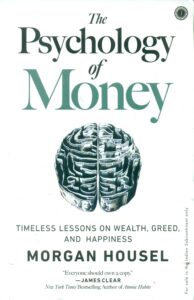Discover the psychology of money key takeaways that reveal the true nature of wealth, financial decisions, and long-term success. Learn how mindset shapes financial freedom.
Money isn’t just about numbers—it’s deeply connected to psychology, behavior, and long-term thinking. The Psychology of Money by Morgan Housel is a game-changer, offering powerful insights into why people make irrational financial decisions and how to develop a healthy, wealth-building mindset. If you’ve ever wondered why some people thrive financially while others struggle—regardless of income—this book holds the answers.
Let’s dive into the psychology of money key takeaways and uncover how these insights can transform your approach to wealth-building, financial security, and long-term success.

1. Wealth Is a Mindset, Not Just Numbers
Many people chase high incomes, believing it guarantees financial success. But the truth? Real wealth isn’t about flashy cars or designer clothes—it’s what you don’t see. It’s the money saved, invested, and wisely managed. True financial independence comes from controlling your spending, resisting lifestyle inflation, and making conscious choices about where your money goes.
Take Action:
- Track your expenses and identify areas where you can cut unnecessary spending.
- Set a savings goal and automate contributions to an emergency fund or investments.
2. The Psychology of Money Key Takeaways: The Power of Compounding and Patience
One of the most fascinating psychology of money key takeaways is the magic of compounding. Small, consistent investments grow exponentially over time. Warren Buffett didn’t become one of the richest people overnight—it was decades of smart investing and patience.
Take Action:
- Start investing NOW. Even if it’s a small amount, let time work its magic.
- Avoid the temptation to cash out early. Stay invested for the long run.
3. Luck and Risk: The Unseen Forces in Wealth Building
People love to believe financial success is purely about hard work, but luck and risk play a bigger role than we admit. Some people are in the right place at the right time, while others face unexpected setbacks despite smart decisions. Instead of focusing on what you can’t control, build a strategy that accounts for risk and creates financial resilience.
Take Action:
- Diversify your investments to minimize risk.
- Maintain an emergency fund for unexpected downturns.
4. Spend Less Than You Earn—Always
No matter how much you make, financial freedom comes down to one golden rule: Spend less than you earn. It sounds simple, but it’s a game-changer. People who master this habit build wealth effortlessly, while those who don’t find themselves stuck in financial stress, no matter their income level.
Take Action:
- Create a budget that prioritizes saving and investing first.
- Avoid lifestyle creep—when your income increases, save more instead of spending more.
5. Your Financial Behavior Determines Your Future
Forget about IQ or degrees—your emotions, discipline, and decision-making shape your financial destiny more than anything else. The biggest financial mistakes aren’t about bad math; they’re about fear, greed, impatience, and lack of discipline.
Take Action:
- Recognize your emotional triggers around money (fear of missing out, panic selling, impulse spending).
- Develop a long-term financial plan and stick to it, no matter what the market does.
6. Freedom Is the Ultimate Wealth
What’s the point of money if you’re constantly stressed about it? Real wealth isn’t about material possessions—it’s about control over your time, choices, and lifestyle. The ability to walk away from a toxic job, take time off without worry, or pursue your passions is the ultimate financial goal.
Take Action:
- Define what financial freedom means to you and set goals accordingly.
- Prioritize financial security over short-term luxury.
7. Long-Term Thinking Beats Short-Term Wins
The stock market fluctuates, economies rise and fall, and trends come and go. The people who win in the long run are those who stay the course, ignore short-term noise, and focus on steady, sustainable growth.
Take Action:
- Invest in assets with long-term value rather than chasing quick profits.
- Keep emotions out of financial decisions—patience always wins.
Final Thoughts: Change Your Money Mindset, Change Your Life
The psychology of money key takeaways reveal that true financial success isn’t just about earning more—it’s about thinking differently. By shifting your mindset, embracing long-term strategies, and making better financial choices, you can build lasting wealth and security.







